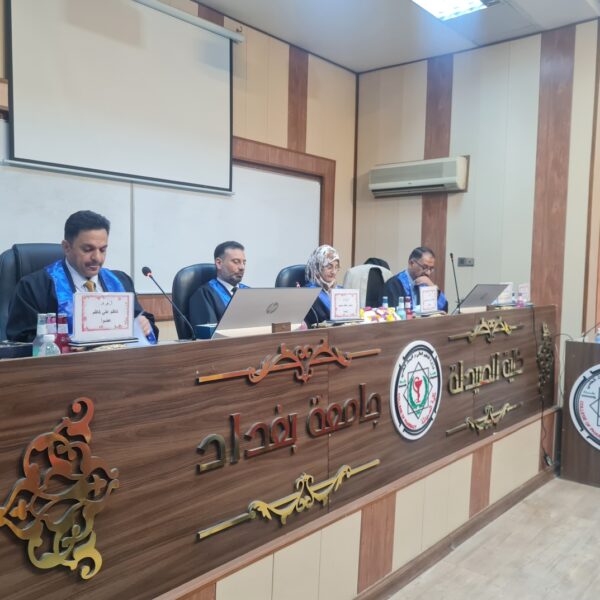The Faculty of Pharmacy discussed the master degree thesis titled Impact of Gliclazide Modified Release or Glimepiride as Add-on Therapy to Metformin on Glycemic and Oxidative Stress Parameters in a Sample of Iraqi Patients with Diabetes: A Comparative Study by the student Fadhel Ali Shihab and his supervisor, Dr. Ali Lateef Jasim, in the Clinical Pharmacy Department on July 10, 2023. The thesis aimed to evaluate the impacts of gliclazide modified release versus glimepiride as an add-on to metformin therapy in uncontrolled T2DM on oxidative stress, lipid profile levels, and hepato-renal function beyond glycemic control.The thesis included a prospective comparative field-based trial that was carried out from February 1 to November 30, 2022, in the Thi-Qar specialized diabetic, endocrine, and metabolic center. A total of 66 patients were allocated into 2 groups (33 patients per group) based on the addition of sulfonylureas.The first group was on daily oral gliclazide MR 60 mg, whereas the second group was on daily oral glimepiride 2 mg. The patients were evaluated before and after 16 weeks of sulfonylureas addition by measuring the levels of oxidative stress biomarkers, including reduced glutathione (GSH), superoxide dismutase (SOD), malondialdehyde (MDA), protein carbonyl (PC), and advanced oxidative protein products (AOPPs). In addition to the measurements of lipid levels, hepato-renal function tests, and glycemic indices,The results of the study showed significant drops in SOD (P < 0.001), MDA (P < 0.001), AOPPs (P = 0.009), and PC (P = 0.001) and a significant increase in GSH (P = 0.029) levels after gliclazide MR add-on therapy. There were significant drops in SOD (P = 0.026) and MDA (P < 0.001) levels after glimepiride add-on therapy. There were significant differences in the improvements of AOPPs (P = 0.005) and PC levels (P = 0.048) in the gliclazide group compared to the glimepiride group, with non-significant differences in the improvements of GSH, SOD, and MDA between both groups. There was a significant difference in both the improvement (P = 0.002) and regression (P = 0.003) of the urinary albumin-creatinine ratio (ACR) in the first group only. At the end of the study, there were no significant differences in glycemic control, lipid profile, or hepato-renal function improvements between the two groups.The study concluded that glycemic control plays an important role in relieving oxidative stress. Among modern SUs, the combination of gliclazide-modified release and metformin may be the combination of choice in clinical practice due to its superiority in glycemic control, oxidative stress reduction, and albuminuria regression. These beneficial impacts of the gliclazide modified release add-on play a role in slowing the progression of diabetic vascular complications, particularly nephropathy, among Iraqi T2DM patients. The glimepiride add-on therapy is a good alternative in cases where gliclazide MR is not feasible for SUs candidates with T2DM.




